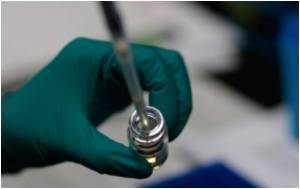University of North Carolina and Vanderbilt University researchers have identified a novel live vaccine method for SARS and coronaviruses.

This work may offer reassurance at a critical time. Public attention was recently heightened regarding a novel human coronavirus that sickened at least two with respiratory and kidney disease, killing one in the Middle East. The SARS outbreak in 2002 and 2003 caused 50 percent mortality in older adults. A rapid and effective international response ended the outbreak in just four months. The final tally: 8,422 cases of SARS, resulting in 916 deaths.
"We originally thought that the virus might find a way to fix the mutations we engineered or work around them as viruses often do. That didn't happen, and in this case, the attenuated viruses replicated well enough and long enough to generate a protective immune response, even in immunocompromised animals, so it works wonderfully as a vaccine in an animal model," said Rachel Graham, Ph.D., a research associate at UNC, who led the research.
The study is the culmination of more than a decade of collaboration between the laboratories of Mark Denison, M.D., Craig-Weaver Professor of Pediatrics and professor of Pathology, Microbiology & Immunology at Vanderbilt University School of Medicine, and Ralph Baric, Ph.D., professor of Microbiology, Immunology and Epidemiology at the University of North Carolina at Chapel Hill's Gillings School of Global Public Health. The researchers' aim is to better understand how coronaviruses, which also cause the common cold, evolve and spread between species.
Denison's lab developed the attenuated SARS virus by disabling a unique exoribonuclease (or ExoN) protein, referred to as a proofreading protein. Previous Vanderbilt studies had shown that disabling ExoN knocks out the virus's ability to correct mistakes, increases mutations twentyfold, and stops its ability to cause disease, at least in the lab setting. Graham, formerly a graduate student in Denison's lab, was able to continue the work in animal models as a postdoctoral scientist in Baric's lab.
Coronaviruses are RNA viruses known to have the largest genomes in the RNA viral world. It is now understood that the ExoN proofreading protein allows coronaviruses to maintain their expanded genomes, with many proteins evolved to help them survive and spread. But deactivation of ExoN creates a particularly enticing potential approach to vaccine design.
Advertisement
To test the likelihood of reversion to virulence, researchers allow a virus to grow in a host that lacks immunity. In the current study, even in very young, very old and immunocompromised animals, the virus did not kill and could persist for a long time without showing signs of a return to virulence.
"If we can't have a vaccine ready to administer that works for all coronaviruses, then we at least have a strategy for fast production of a functional vaccine for any new epidemic coronavirus that might arise. That's a key take-away point of our paper and what makes it so important in the face of current events," Graham said.
Source-Eurekalert











